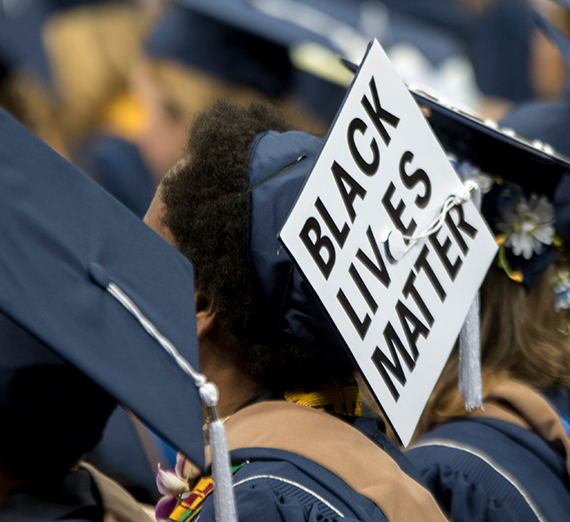Black Theology Responds to Black Lives Matter

When someone professes the Nicene Creed, the only creed accepted as authoritative by mainstream Christian denominations, one acknowledges catholicity: “We believe in one holy catholic and apostolic church.” During the fall Flannery lecture, Andrew Prevot said this “catholicity,” in order to be authentic, must be connected to a specific affirmation of black lives.
Prevot, associate professor of Systematic Theology at Boston College, explained that catholicity does not refer just to the Roman Catholic Church. “This idea of being catholic is really about developing an unrestricted love – a love for everyone without boundary, without borders; not reserving your love just for a few, just for those who look like you, but extending your love to everyone in the way that God does.”
Citing black theologians like James Cone, known as the founder of black theology, Prevot connected the major tenet of black theology to catholicity: “In addition to saying that black Christians are bearers of catholicity, black theology also contends that no Christian is truly catholic without the affirmation of black lives.”
Prevot connected this necessity to affirm black lives to the recent Black Lives Matter movement and acknowledged the ways in which people often refute the movement. “The claim that Black Lives Matter sounds too particular, too preferential, too partial,” and, “The response that ‘All Lives Matter’ comes quickly.”
But, for Prevot, Black Lives Matter and All Lives Matter do not contradict one another. “If you really believe that all lives matter, then you should have no problem saying that black lives matter.”
This is connected to Prevot’s sacramental way of understanding catholicity, seeing the whole in the particular. He utilized the Eucharist as an example for this sacramental understanding and as an example for what our love should be like: “When the Eucharist is consecrated, Christ is present fully in each piece of bread, and even if you break it into multiple parts, the presence of Christ is still fully there in each of those little individual segments.”
Because the universal is found in the particular, Prevot argued that the “Black Lives Matter movement offers Christians a path toward a truer catholicity.”
Showing the audience a picture of a black Jesus, Prevot ended with this conclusion: “If you’re not actively loving these people, you’re not catholic, you’re not Christian, and you’re not a good human being.”
During a question and answer session, one student asked, “What roles do Catholic institutions, similar to Gonzaga, play in the role of catholicity and in the affirmation of black lives?”
Prevot responded, “I would just suggest that everyone try to think creatively. What are the kinds of issues that are going on here in Spokane? What are the issues going on in Washington state? What can you do in your local community to make a difference affirming black lives and the lives of other vulnerable populations? I don’t have all the answers, but you may find them if you’re making it a priority to seek them out in your own life.”
The Flannery Chair of Roman Catholic Theology is an endowed chair gift of the late Maud and Milo Flannery of Spokane, to further excellence of theological study and teaching at Gonzaga University. The Flannery Lecture is delivered twice per year by an outstanding theologian who is invited to campus especially for the lecture.
Stay up-to-date with related events here.
